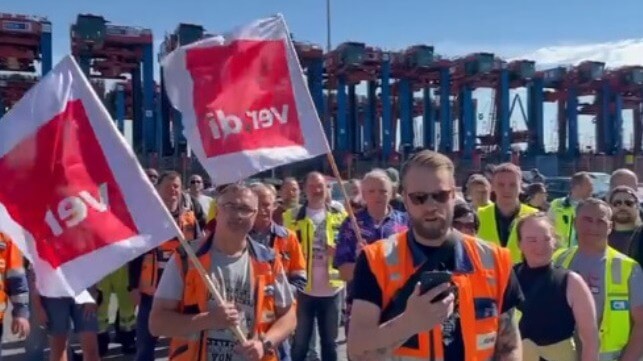Strikes ahead of collective bargaining negotiations paralyze German seaports

Energy union Ver.di has called another round of “warning strikes” at major container ports, starting on Tuesday and lasting until Wednesday before the next round of wage negotiations begins. The union says openly that its aim is to pressure terminal operators, represented by the Central Association of German Seaport Operators (ZDS), to reach a deal, but describes the offers so far as “inadequate” to keep pace with inflation and job demands.
In June, the dock workers held a series of strikes linked to the three previous rounds of negotiations. Under German labor law, the union is free to call these short-term “warning strikes” without having to hold a full vote of the members each time. In May, negotiations began on the new collective agreement for 11,500 employees in German North Sea ports.
Workers at the Port of Hamburg stopped work on Tuesday morning, July 9, at the start of the first shift of the day and began protests in the port area. This strike is set to continue across all three shifts on Wednesday. Ver.di reports that there will also be a larger protest rally on Wednesday.
The port of Bremen/Bremerhaven took part in the strike on Tuesday afternoon. The strike is scheduled to last until the first shift on Wednesday. While Bremerhaven is scheduled to resume work, the dock workers in the westernmost seaport of Edem will stop work for the entire shift on Wednesday.
“The right to strike is enshrined in the constitution,” said a statement from the ZDS on the union’s announcement of the strike. “However, when exercising the right to strike, moderation and balance should be maintained. In view of the constructive rounds of negotiations to date and the fair offer presented, the ZDS believes there is currently no reason for warning strikes that would affect the reliability of German seaports.”
ZDS described the previous rounds of negotiations as “intense but constructive” and said it remained confident of reaching a collective agreement in the next round of negotiations. While the talks are scheduled for July 11 and 12, it stressed that terminal operators need to invest in transforming their operations while also feeling the economic impact of the current business environment.
“Even in the third round of negotiations, we were still far apart,” said Ver.di negotiator Maren Ulbrich. “The employers’ offer is not acceptable to us. The employers still have a lot to do, especially with regard to the wage increases they have offered.”
Ver.di is demanding a wage increase of three euros per hour as well as further concessions due to the waiver of shift allowances in the 2022 collective agreement.
The strikes began in June and affected plants in Hamburg, Bremen, Bremerhaven, Brake and Edem. The Wilhelmshaven container terminal stopped work on June 27 to put pressure on the employers.
“The affected Maersk ships in Hamburg and Bremerhaven will monitor the duration of the strike and recover from the effects when operations are fully resumed,” the shipping company wrote in its latest customer information. It had previously warned of a possible overload of the ports and said it would consider cancelling planned port calls in order to keep to the schedules. For the shipping companies, the strike comes as they are already under severe deadline pressure due to the diversions from the routes in the Red Sea.
Ver.di stressed that they have closed the ports for a total of 80 hours in 2022 through a series of warning strikes. They said additional strikes would depend on the progress of this week’s talks, but said additional strikes may be necessary.



